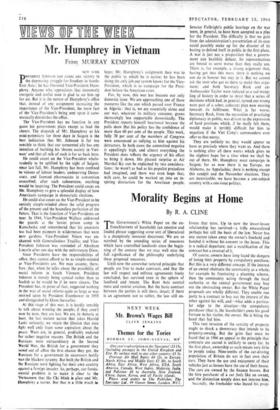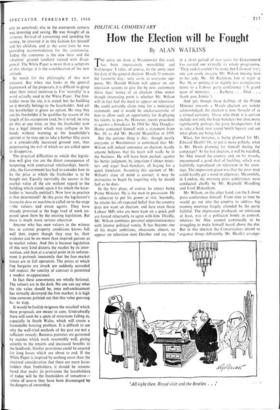Morality Begins at Home
By R. A. CLINE
MHE Government's White Paper on the en- I franchisement of leaseholds (an emotive and loaded phrase suggesting some sort of liberation) is a deceptively innocent document. We are so numbed by the unending series of measures which have controlled landlords since the begin- ning of the century that we may well miss the full significance of the philosophy underlying these proposed measures.
Until now the somewhat tattered principle that people are free to make contracts, and that the law will respect and enforce agreements freely concluded, has survived even in the sphere of landlord and tenant. The Rent Acts control rents and restrict eviction. But the basic contract between the parties is still there, intact; if there is an agreement not to sublet, the law still en- forces that term. Up to now the lessor-lessee relationship has survived—a trifle emasculated perhaps but still the basis of the law. Never has any statute taken away the owner's freehold and handed it without his consent to the lessee. This. is a radical departure; not a modification of the contract but a reversal of it.
Of course, owners have long faced the dangers of losing their property by compulsory purchase„ But this is a very different concept. If the interest. of an owner obstructs the community as a whole; for example by frustrating a planning scheme, then the community acting through the local authority or the central government may buy out the obstructing owner. But the White Paper proposals are wholly different. They enable one party to a contract to buy out the interest of the other against his will, and—what adds _a particu- lar edge to the situation—the compulsory purchaser (that is, the leaseholder) owes his good fortune to his victim, the owner. He is biting the hand that fed him.
This vast invasion of the sanctity of property ought to shock a democracy that intends to be property-owning. But the grim fact must be . faced that in 1966 an appeal to the principle that contracts are sacred is unlikely to carry far. In' the first place, ownership as such means very little to people today. Nine-tenths of the car-driving population of Britain do not in fact own their cars. They have the use and enjoyment of their vehicles just as lessees have the use of their house. The cars are owned by the finance houses. But the hire purchaser of a car feels like an owner, and the distinction simply does not interest him.
Secondly, the freeholder who leased his prop- erty to somebody else in the nineteenth century was investing and saving. He was thought of as virtuous. Instead of consuming and spending his money, he invested it in this fashion for himself and his children, and at the same time he was providing accommodation for the community. Today the consumer is the new hero and the 'absentee' ground landlord viewed with disap- proval. The White Paper is more than a symptom of this change: it is the sanctification of the new attitude.
So much for the philosophy of this new measure. But when one looks at the general framework of the proposals, it is difficult to grasp what their moral intention is. For 'morality' is a word actually used in the White Paper. The free- holder owns the site, it is stated, but the building on it morally belongs to the leaseholder. And yet the leaseholder is given an option. He may buy out his freeholder if he qualifies by reason of the length of his occupation (and, be it noted, he may do this at any time, so that the freeholder now has a legal interest which may collapse in his hands without warning at the leaseholder's option) or he may opt to take a further fifty years at a considerably increased ground rent, thus perpetuating the evil of which we are called upon to disapprove.
The practical difficulties to which this legisla- tion will give rise are the direct consequence of tampering with contractual relationships. Inevit- ably, the Government has had to consider how to fix the price at which the freeholder is to be bought out. Equally inevitably the answer is the market value of the site without regard to the building which stands upon it (to which the lease- holder is 'morally entitled'). Now how in practice is that determined? At this point the legislature's favourite dens ex machina is called on to the stage —the valuers and estate agents. They have already protested at the huge load of work im- posed upon them by the existing legislation. But there is much more serious objection.
Anyone who has seen valuers in the witness bos in current property conditions knows full well that, expert though they may be, their evidence can be no more than inspired guesses as to market values. And this is because legislation of this very kind distorts the market by its inter- vention, and then at a crucial point in its enforce- ment it pretends innocently that the free market forces are in full operation. The prices at which free bargains are struck are suddenly accorded full respect; the sanctity of contract is permitted a modest re-appearance.
In fact these assessments are wholly fictional. The valuers are in the dark. No one can say what the site value should be, 'once enfranchisement has virtually destroyed the free market; it is high time someone pointed out that this value guessing ha:: to stop.
- It would be foolish to ignore the mischief which these proposals are meant to cure. Undoubtedly there will soon be a spate of reversions falling in, especially in South Wales, which will create a formidable housing problem. It is difficult to see why the well-tried methods of the past are not a sufficient remedy. Business premises are governed by statutes which work reasonably well, giving security to the tenants and increased benefits to the landlords. Similar provisions could be enacted for long leases which are about to end. If the White Paper is inspired by nothing more than the electoral consideration that there are more lease- holders than freeholders, it should be remem- bered that under its provisions the leaseholders of today will be the freeholders of tomorrow— unless of course they have been discouraged by the dangers of ownership.



































 Previous page
Previous page